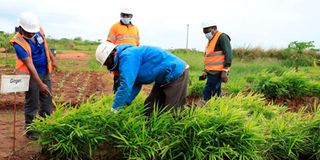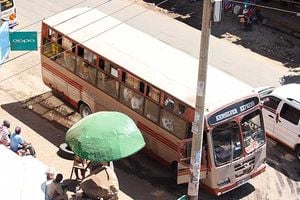Kwale: Sea of poverty amid titanium riches

Workers plant vegetables as a way of rehabilitating the land in areas mining took place at the Base Titanium site in Kwale County on June 29. file | nation
Mr Joseph Kyalo, 70, pauses for a while when asked about the land he got as compensation after moving out of the area allocated for titanium mining in Kwale County.
He goes into deep thought, then his face creases into a mischievous smile that soon gives way to a full-throated laughter.
“I sold it,” he says, revealing that he got Sh500,000 for the five acres.
But who would want to buy a piece of marshy land on which they could neither plant anything nor put up a house.
The mischievous grin returns to his face as he explains that he found a buyer during the dry season.
Like many other people who were moved from Maumba to Bwiti settlement scheme, he not only found the land uninhabitable, but also occupied by members of the local Digo and Duruma communities, who reportedly vowed that they would not allow ‘outsiders’ onto their ancestral land, the fact that they had been issued with title deeds by the government notwithstanding.
Mr Kyalo is one member of a group that has been agitating for enhanced compensation, arguing that the Sh80,000 they received per acre was not enough. The group further argues that the ‘free’ land at Bwiti was not accessible as it was occupied by squatters. Besides, Mr Kyalo and his peers argue, the low-lying marshy land was not suitable for settlement.
He pines for life back at Maumba.
“I had nine acres that I used to farm. Currently, I cannot rely on farming,” said Mr Kyalo on the parcel he bought after selling off his Bwiti title.
He explains that none of them had seen the land they were to be allocated. They were just asked to pick numbers, after which balloting was used to determine who would get what parcel. After that, he says, they were given title deeds and then transported in trucks with all their belongings to what turned out to be swampy land.
“I am not a rice farmer,” he says matter-of-factly.
Despite an abundance of minerals and the presence of one of the largest mining companies in the country, poverty levels still remain high in Kwale County.
Money in form of royalties, which could have benefited the residents, does not seem to trickle down to the impoverished villages.
Residents of the titanium-rich Maumba and Nguluku villages were moved out a decade ago to pave the way for titanium mining, currently being undertaken by Base Titanium, a subsidiary of an Australian company, Base Resources.
They now complain that despite not being adequately compensated, they are yet to get any royalty fees from mining activities on their former parcels of land.
They were each paid “a paltry” Sh80,000 per acre by Tiomin Kenya Ltd, a wholly owned subsidiary of Canadian firm Tiomin Resources, which had acquired the rights to mine titanium before selling them to Base Resources.
Tiomin Kenya Ltd was unable to start the mining project, which is the reason its mining rights were acquired by Base Resources.
According to the residents, there was no public participation ahead of compensation and they were never given any disturbance allowance to move out of their land.
Mr Gideon Masyuki, a community leader and spokesman, said: “Look at this area, it is all swampy, you cannot build a house or engage in any meaningful farming activities.”
He says they had no choice but to buy land elsewhere after surrendering their original farms. According to Mr Masyuki, the residents were also promised that their kin would get jobs at the mining company, but none were forthcoming.
“At least 10 per cent of the mining company’s sales was to be given to the communities that were displaced,” said Mr Masyuki at his home in Chigombero village in Msambweni.
Mr Masyuki said they were given cotton seeds by the mining company to plant on their new farms but the venture was not successful.
Mr Masyuki is also part of a team that drafted a long memorandum to the government demanding to be moved back to their original homes once Base Titanium moves out.
He quotes a 1998 letter by then Tiomin CEO Jean Charles Portivin: “Lease shall lapse after 21 years when land reverts to original owner.”
However, that was in reference to the initial plan, under which Tiomin was to lease the land for a specified period. Later, plans changed and the government acquired the land and then gave the mining concession. This means the land should revert to the government and not the original inhabitants.
Government documents show that altogether, 1,518 households totalling 7,590 individiuals were moved out of the mining area.
Base Titanium external affairs manager, Dr Melba Wasunna, said compensation and resettlement was coordinated by a District Resettlement Compensation Committee (DRCC) chaired by the then District Commissioner.
However, she admitted that concerns had been raised that the resettlement of the former residents of Maumba and Nguluku villages was not done properly.
On employment, Dr Wasunna said priority is given to residents who were moved, but they must meet the qualifications required.
Additional reporting by Macharia Gaitho





